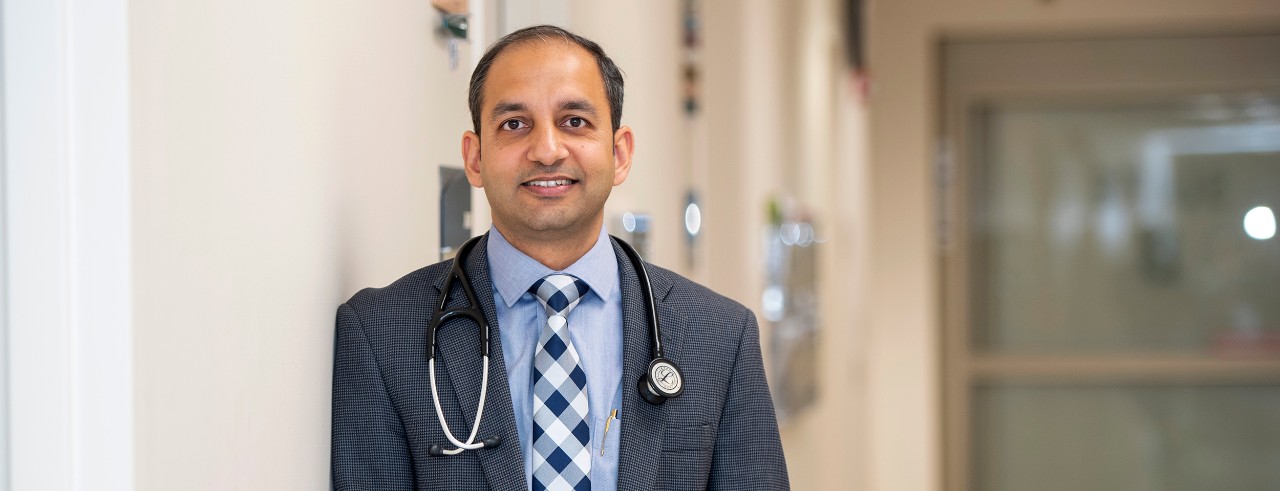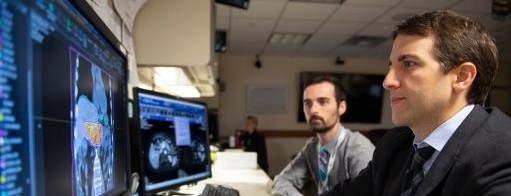
Innovative approaches to liver cancer care
UC to launch new immunotherapy, transplant research as other clinical trials continue
October is Liver Cancer Awareness Month, and University of Cincinnati researchers are preparing to launch one of the first U.S. clinical trials that will study how a combination of immunotherapy and transplant can improve outcomes for liver cancer patients.
Davendra Sohal, MD, associate professor of medicine, director of experimental therapeutics, clinic medical director in UC’s Division of Hematology/Oncology and a UC Health physician, is leading a new trial that will soon commence, combining immunotherapy treatment with transplants. Immunotherapy helps boost and train the body’s own immune system to identify and kill cancer cells.
Currently, immunotherapy drugs are only used in late-stage liver cancer patients, where the disease is no longer curable but is still treatable, and the treatment has proven to be beneficial.
“Our goal is to move it up front and treat patients even with earlier forms of liver cancer to get immunotherapy hopefully and get a liver transplant,” Sohal said. “We are working off of our strength, which is the liver transplant program, as well as this new development in immunotherapy, combining the two to improve outcomes.”
Sohal said many patients with early liver cancer are not able to make it to a transplant stage because their disease advances too rapidly, so the hope is that by using immunotherapy the cancer will be held in check long enough for a transplant and cure.
Jordan Kharofa, MD, associate professor in the UC Department of Radiation Oncology and a UC Health physician, said using immunotherapy in early-stage liver disease has not been tested before. This combination treatment is being “cautiously pursued,” he said, to determine if activating a patient’s immune system through immunotherapy could potentially cause a rejection of a transplanted organ.
Risk factors and screening
Sohal explained the main risk factor for liver cancer is cirrhosis of the liver. The main risk factors for cirrhosis include alcohol use, hepatitis B (which has a vaccine and is becoming less common) and hepatitis C, he said.
According to Sohal, recent research has also found obesity as a risk factor for cirrhosis and liver cancer through inflammation of the liver from fat, known as fatty liver disease.
Patients with liver disease should be screened for liver cancer via ultrasound about every six months, Sohal said. Individuals with risk factors for liver disease or cancer but no current diagnosis should see a gastroenterologist or hepatologist to determine the routine checks needed based on each individual’s situation.
Sohal said the common cancer treatments of surgery, radiation and chemotherapy are often used to fight liver cancer, but liver transplant is a unique treatment compared to other cancers. Led by Shimul Shah, MD, UC’s liver transplant program performs about 150-160 transplants per year.
According to the National Cancer Institute (NCI), approximately 42,000 Americans are diagnosed with liver cancer each year, and an estimated 30,000 patients die of liver cancer in the U.S. each year. The NCI states liver cancer is the sixth most deadly and 13th most common cancer in the U.S.

Dr. Jordan Kharofa, associate professor of radiation oncology. Photo/Colleen Kelley / UC Creative Services
Proton therapy trial continues
UC is also one of about 40 centers throughout the country participating in a clinical trial studying the effects of proton therapy on localized liver tumors, through NRG Oncology, a national cancer clinical cooperative group. Kharofa said proton therapy is a more precise, low-dose radiation treatment that can treat liver cancer while sparing healthy, noncancerous liver tissue nearby.
Proton therapy works by extracting positively charged protons from hydrogen gas and accelerating them through a particle accelerator up to nearly two-thirds of the speed of light. The protons are guided to the tumor site by magnetic and electrical fields. They are propelled with just enough energy to reach a precise point in the tumor and then stop before they can harm noncancerous tissue.
“The thought is that protons might actually be much better tolerated by patients, causing less liver dysfunction,” Kharofa said. “You can actually give more radiation dosage that way. Some earlier studies seemed to indicate there might be a survival advantage for having protons.”
For more on UC’s open liver cancer clinical trials and enrollment information, call 513-584-7698.
Featured photo at top of Dr. Sohal. Photo/Colleen Kelley/University of Cincinnati
Related Stories
UC chief digital officer named Info-Tech 2024 CIO award winner
December 3, 2024
Info-Tech Research Group recently named UC Vice President & Chief Digital Officer Bharath Prabhakaran a 2024 CIO Award winner in the Large and Enterprise Organization Division.
How to get rid of a stuffy nose fast
December 3, 2024
Findings in the International Journal of General Medicine reveal that a stuffy nose can trigger fatigue, brain fog and sleep disruptions that seriously interfere with daily activities. Now a University of Cincinnati College of Medicine professor of otolaryngology is sharing how to get rid of a stuffy nose quickly and naturally.
Lorain County prosecutor seeks to toss conviction for wrongfully...
December 3, 2024
Al Cleveland, Jr., a client of the Ohio Innocence Project at Cincinnati Law, is one step closer to exoneration. The Lorain County prosecutor has filed to throw out his conviction, making the end of his 25 year ordeal within reach.
